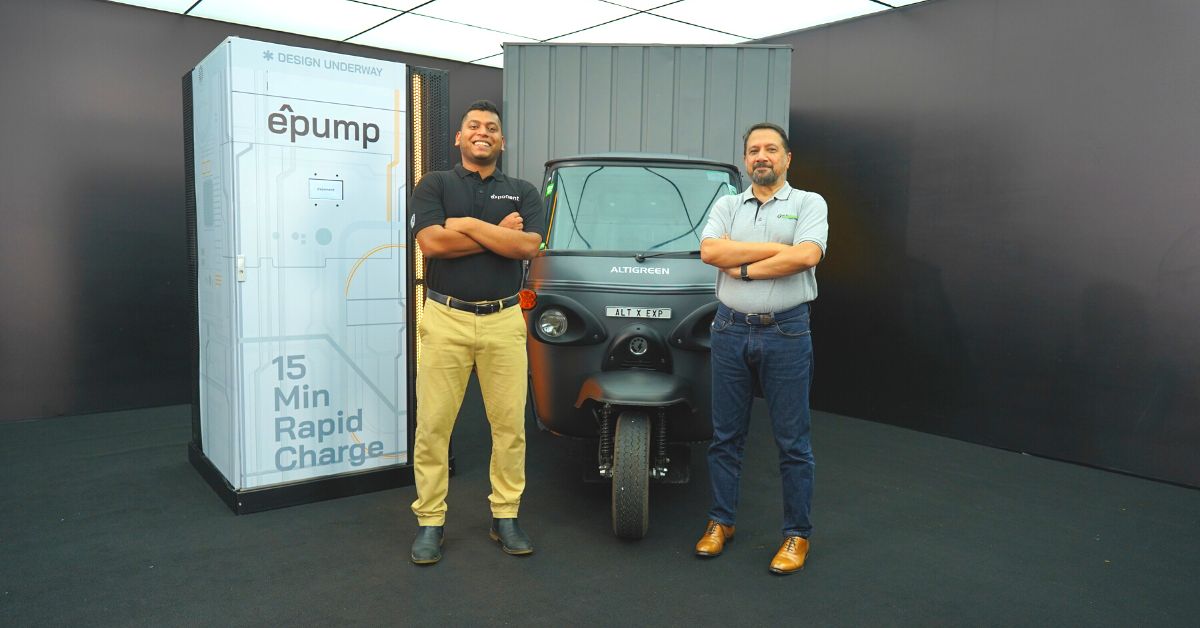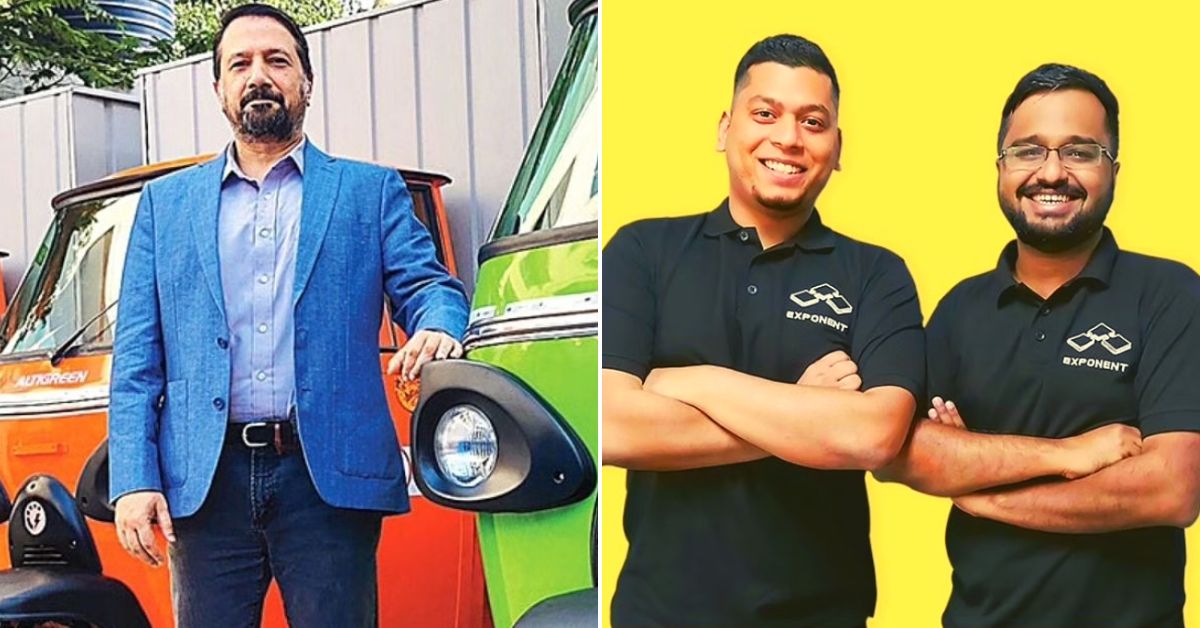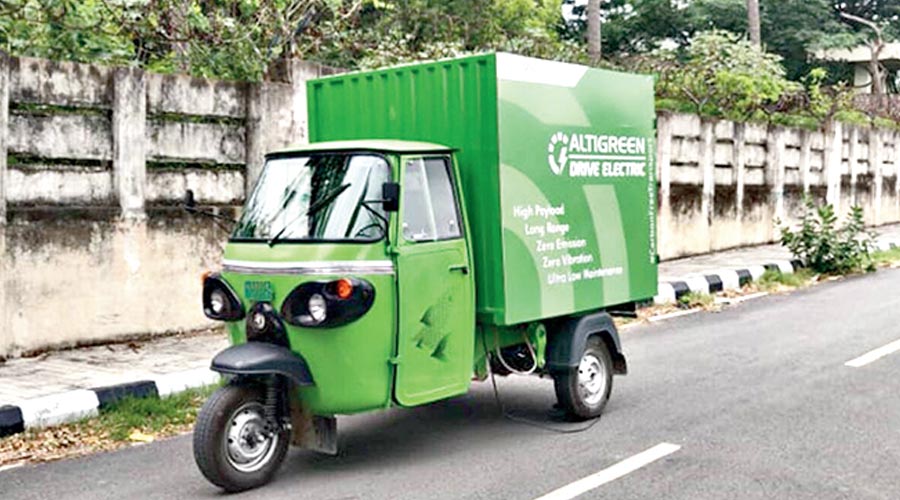World’s Fastest Charging 3-Wheeler Unveiled: Meet the 2 EV Startups Behind It
Unveiling the fastest charging electric 3-wheeler, EV startups Exponent Energy and Altigreen Propulsion Labs have announced a partnership that can transform last-mile electric mobility.

Little more than two years ago, Dr Amitabh Saran, the founder of Bengaluru-based electric vehicle (EV) venture, Altigreen Propulsion Labs, set a challenge before Arun Vinayak, the CEO of Exponent Energy. Could he develop a battery solution that can charge in 15 minutes or less?
Skip ahead 18 months, Arun and his team at Exponent Energy developed a battery pack and charging station called e^pack and e^pump that together unlock 0 to 100 per cent rapid charge within 15 minutes for all commercial vehicles using affordable lithium-ion cells.
“We were initially in disbelief. Using regular lithium-ion cells, Exponent Energy created an entire energy stack that allows vehicle operators to rapid charge in 15 minutes,” says Amitabh, speaking to The Better India.
Fast forward to 3 August 2022, Altigreen Propulsion Labs and Exponent Energy have unveiled the fastest charging electric three-wheeler in the world that rapidly charges from 0 to 100 per cent within 15 minutes.
The Altigreen neEV HD has an 8.19 kWh e^pack—a proprietary battery by Exponent. The vehicle delivers a city drive range of 80-85 km and charges up in 15 minutes at Exponent’s e^pump network.
This is achieved by the e^pump delivering 600A of current to the e^pack (15x industry standard) while managing individual cell characteristics including thermals to ensure safety, long battery life, and performance consistency even at 50 degrees Celsius. Exponent Energy claims that rapid charging allows them to deliver a battery which is 30 per cent smaller than the long-range version that Altigeen has currently, without compromising on the customers ability to use a vehicle throughout the day.
“For all of India to go electric, EVs need to charge faster and last longer. Our e^pack and e^pump make this possible with 15-minute rapid charging and 3,000 cycle life warranty (a new industry standard). By being cell agnostic, we can leverage the existing manufacturing ecosystem that produces LFP (lithium ferro-phosphate) and NMC (nickel manganese cobalt) cells extensively, and scale much faster,” says Arun, co-founder and CEO of Exponent Energy.
“If you go to a CNG pump in Delhi today, it takes about 45 minutes to refill your vehicle with gas. Until recently, Altigreen had the fastest charging electric three-wheeler in the country (in three hours). And now, Altigreen is all set to have the fastest charging electric three-wheeler in the world. We’re amazed by the quality of the pack and the use cases it opens up for us as an OEM in the marketplace,” claims Amitabh.
Elaborating further on the partnership between the two ventures, Arun adds, “Altigreen’s engineering first approach gave us the confidence to work with them and made us realise they are the best partners for us. Hats off to engineers at both Exponent and Altigreen for making rapid charging not only a concept but a roadworthy reality in such a short period of time.”
An engineering-first approach
Altigreen was the first OEM that Arun met even before starting Exponent Energy. They’re one of the few OEMs that have built their complete stack in-house.
“They’re an engineering-first company. Unlike many other ventures in the e-mobility space that take a trading approach of sourcing components from different vendors, Altigreen has put in the hard work over many years to build EVs from scratch in India. They control every piece of their tech stack and vehicles. That shows in the experience of the vehicle, loading capability, software reliability, throttle response or their independent suspension. It was very clear to us that this is one of the best three-wheelers. In fact, it’s better than diesel vehicles when it comes to the drive experience,” notes Arun.
“What we built here at Exponent is not something you can buy and put together. Both teams have to work very closely together. There are iterations, blow-ups, failures, etc. They’ve been so great with us working through these failures in the past many months as we tested and perfected the product. Today, we feel this product is ready for launch,” he adds.
Altigreen has been building EV technology since 2012-13. They realised early on that until this technology is created for India, they’re not going to be able to compete with diesel-powered vehicles. In the commercial cargo space, diesel is the number one fuel being used, followed by CNG. Manufacturers have perfected their technologies to ensure that their vehicles can now take abuse commonly found on Indian roads whether it’s potholes, water-logging, loose stones, high temperatures, overloading, unprofessional driving, etc.
“We understood that until we’re able to create similar EVs, it’s not right to burden customers by telling them to make that switch and then giving them a compromised vehicle. It has to be at least as good as the incumbent. With that in mind, we first built the tech stack which means motors, the entire drivetrain, electronics, controllers, battery, BMS, gearbox, software stack, display and dashboards including the wire harness. After building the tech stack, we built a two-wheeler, a three-wheeler and a four-wheeler. We displayed all these vehicles at the Auto Expo and let customers decide which one of them they were willing to bet on,” recalls Amitabh.
Everyone chose their electric cargo three-wheeler because they have the longest range (in the three-wheeler electric vehicle category) on a single charge and the largest volumetric capacity.
“Our three-wheeler can carry about 90 per cent of the volumetric load a typical small four-wheeler commercial vehicle carries. Also, ours is the fastest moving three-wheeler on Indian roads and offers the highest ground clearance too. It was built keeping in mind Indian roads and conditions with Indian technology and innovations because of which Altigreen today has 26 global patents. We’re not fly-by-night operators and don’t subscribe to the trader mentality of sourcing the motor or gearbox from another vendor,” he claims.
Three-wheelers are very important vehicles, particularly in emerging markets, because of their nimbleness. They allow you to drive on narrow roads, carry heavy loads, cost much less and perform as well.
“If you consider a typical small four-wheeler commercial vehicle, which e-commerce companies use to deliver items to your workplace or residence, it costs about Rs 7 to 8 per km to operate. Meanwhile, operating an Altigreen three-wheeler costs approximately 90 paisa per km, which includes the cost of charging and replacing a battery,” claims Amitabh.
It was very clear to the Altigreen founder that the electric three-wheeler market hadn’t been explored as aggressively in the emerging markets of India, South Asia, Africa and South America. These regions have very similar transport needs, drive profiles and environmental conditions too. In other words, they’re making something that is not just for India.
“The first time we charged our vehicle using Exponent Energy’s e^-pack and e^-pump from 0 per cent battery to 100 per cent, we did it in under 14.5 minutes. A commuter will typically bring in a vehicle at say 10-15 per cent charge. So, you’re looking at a charge time of just 10 to 11 minutes. Now, you have a fully-charged vehicle, giving you the same power and performance. This changes the entire way in which we can use last-mile transportation,” he adds.
Exponent has collected data for thousands of charging cycles (equivalent to many lakhs of km) in 18 months of e^pack’s evolution. After six months of joint development and on-road testing with Altigreen, the solution has reached maturity to hit the market. Some of the milestones include five back-to-back rapid charge cycles on a vehicle for a 400-km run in a single day; and clocking over 10,000 km of city-driving in 40 days.
“You can’t even achieve this kind of performance in a fossil fuel vehicle because it heats up,” says Amitabh.
“At Exponent, our role is solving the energy problem. We’ve built an energy stack that can work for any battery cell, any number of battery cells on any voltage platform and is vehicle agnostic. Cargo vehicles are just the start. We will soon move on to passenger vehicles, four-wheelers, etc. There are further markets to go after. We see ourselves playing the role on the energy side and three-wheelers are the first market we have entered,” says Arun.
Meanwhile, the software is a huge differentiator for electric vehicles. There’s a lot that can be done based on the data that is obtained from the motor, battery, sensors, ambient temperatures, cell temperatures, etc.
Speaking about using that data to improve the efficiency of a vehicle, Amitabh says, “When I say efficiency, ultimately it’s all about the juice these vehicles can effectively use. In fossil fuel-powered vehicles, it’s about mileage. It’s about how much you earn and spend on energy. Everyone is trying to improve that equation. However, for EVs, the data allows us more fine-grained control while estimating the user demand and delivering power efficiently. That’s where Altigreen is focussing on. So far, we’ve built our own motors, drivetrain, electronics and software, and now with this Exponent partnership, we have a fast-charging option.”
Meanwhile, Exponent is providing a 3,000 charge cycle warranty on the battery. This is an industry first, claims Arun. In terms of distance covered, it’s close to 2.4 lakh km of warranty.
“The IC-engine vehicles you buy today give you 1 to 1.5 lakh km warranty on the engine. We’re pushing towards a place where EVs can last longer and charge as fast as their diesel-powered counterparts. We are already showing superior performance on the drive side. The battery closely interacts with the motor that Altigreen has built. In vehicles like these, software becomes the big differentiator. That’s where Altigreen does a lot of good things. How do you extract energy from a battery efficiently? It’s all about the motor and software,” he adds.
On the question of motors, Altigreen made a conscious decision in 2013 to move away from magnets.
“We built an AC-induction motor. The beauty of this machine is that it uses the steel and copper available in India and gives you efficiency close to what magnetised motors can deliver. Instead of a 94 per cent efficiency for a magnetised motor, we deliver 92per cent,” claims Amitabh.
“We push the envelope of motor efficiency, because of which our motor often runs at 10,000 rpm. Most of the time, when you drive your car, you’ll notice that after it crosses the 5,000 rpm mark on your dashboard, it enters the red zone. There are very few commercially viable gearboxes that exist in the world that run at 10,000 rpm. So, we had to develop our own gears too,” he adds.

Fastest charging electric three-wheeler: The pilot project
Both Altigreen and Exponent are working towards customers owning the neEV HD from October 2022. Until then, Exponent will continue to do joint testing with Altigreen, following which customer handovers will begin. They will deploy 2,000 vehicles on the road as a pilot.
“We will use this to understand how people are going to be using these vehicles even further, what their earning capacity is like, how much they charge, how often they charge, etc. Based on these parameters as well, we’ll come up with a price that makes our vehicle a very compelling value proposition for them,” says Amitabh.
“More importantly, our primary focus is how do we make charging more efficient and cheaper. With faster charging, the process becomes cheaper. Today, if you take your EV to a public charging station, you have to pay Rs 20-24 per unit of electricity because you’re also paying for the three or four hours (of public parking space) you’re using to charge your vehicle,” notes Arun.
With 15 minutes of full charging on the same piece of land, the charger costs increase a little bit but raise the throughput exponentially. That drops the price of charging, i.e. the rupee per unit you’re paying, which then directly translates into reducing the rupee per km cost.
“So, as against the industry standard of Rs 20 to 24 per unit, we’re looking at Rs 12 to 14 per unit of electricity. This creates unlimited revenue potential for e^pump operators,” he adds.
“Our first metric is pushing 2,000 vehicles and 100 charging stations in every city we operate. Both Altigreen and us are focussing on Bengaluru first because that’s home turf. After meeting this target, we’ll move city by city as we evolve. In this financial year, we should have 100 e^pumps set up in Bengaluru. To put that in context today, there are about 450 petrol/CNG bunks in the city. The objective is to ensure that finding an e^pump by Exponent will be as easy as finding a petrol station,” says Arun.

Funding for the future
With a fresh round of Rs 300 crore investment led by Sixth Sense Ventures, Reliance New Energy, Xponentia Capital, and others, Altigreen is aggressively ramping up its R&D and production capabilities while developing a robust pan-India distribution network to offer what they hope will the best and cleanest last-mile transportation. The same will be used to offer the benefits of Exponent’s 15-minute rapid charging across India.
With their recent fundraising that included the family office of Dr Pawan Munjal, Chairman, and CEO, Hero MotoCorp, Exponent Energy is ramping up its e^pack production and setting up 100 e^pumps across Bengaluru in its first leg. Other cities will follow, in association with Altigreen. If you found our stories insightful, informative, or even just enjoyable, we invite you to consider making a voluntary payment to support the work we do at The Better India. Your contribution helps us continue producing quality content that educates, inspires, and drives positive change. Choose one of the payment options below for your contribution- By paying for the stories you value, you directly contribute to sustaining our efforts focused on making a difference in the world. Together, let’s ensure that impactful stories continue to be told and shared, enriching lives and communities alike. Thank you for your support. Here are some frequently asked questions you might find helpful to know why you are contributing?

Thus far, Exponent Energy has raised USD 6 million from prominent investors such as Motherson Group, a leading global supplier of automotive components along with YourNest VC, 3one4 Capital, AdvantEdge VC, and angel investors Rajesh Yabaji, co-founder & CEO, BlackBuck, Pushkar Singh, co-founder & CEO, LetsTransport.
(Edited by Yoshita Rao)
This story made me
-
97
-
121
-
89
-
167
















